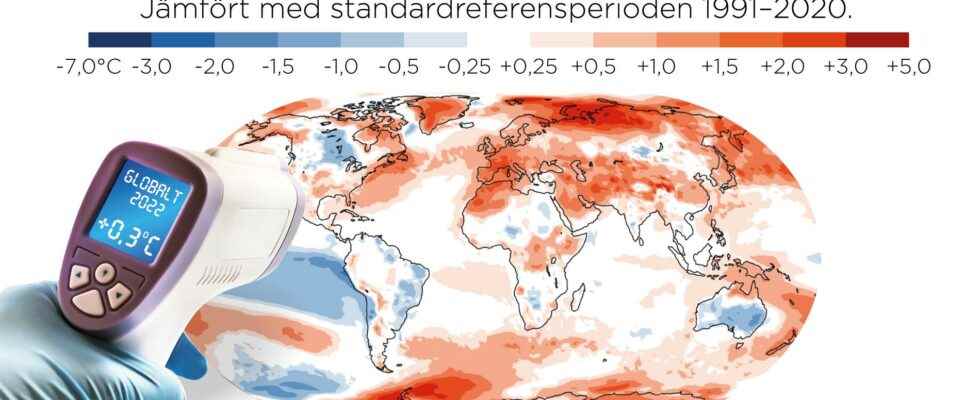Published: Less than 10 min ago
full screen
Next
Average global temperature in 2022 compared to the standard reference period 1991–2020.
1 of 2 Photo: Johan Hallnäs/TT
A record hot summer in Europe and continued increased amounts of greenhouse gases in the atmosphere. 2022 was another year filled with extreme weather worldwide, new climate data shows.
It is starting to become a habit at this point when last year’s climate is to be summed up globally. The extreme weather conditions have become an increasingly common sight in many places, and 2022 proved to be no exception.
According to statistics from the EU’s environmental monitoring program Copernicus (C3S), 2022 was the fifth warmest year on record. All other top quotes are in the near term and the fact is that the last eight years have been the eight warmest recorded.
When it comes to Europe, it’s the summer months that stand out the most. The summer of 2022 was the hottest ever and it was most evident in the western parts of the continent.
In July, a new heat record was noted in Great Britain when the thermometer rose above 40 degrees for the first time. The heat also reached Sweden where it was warmer than usual in many places, above all in Målilla. The Småland resort measured a whopping 37.2 degrees on a July day – the highest temperature in Sweden in 75 years.
The heat combined with the lack of rainfall contributed strongly to countries such as France, Spain, Germany and Slovenia being hit by the worst forest fires in decades.
Looking at the whole year, 2022 was the second warmest Europe experienced, only beaten by the record year 2020.
Extremely dry and extremely wet
Elsewhere in the world, many people have experienced the hottest year on record. In parts of the Middle East, Central Asia, China, New Zealand, north-west Africa and the Horn of Africa, a record warm year has been put behind them.
The consequences of the extreme weather have been devastating. As perhaps most clearly exemplified in the Horn of Africa, where the now common drought during the summer was the worst in 40 years, something that put many millions more people in famine.
The second example is from Pakistan. During the summer monsoon period, four times as much rain fell as normal and as much as a third of the country ended up under water.
Over 1,700 people died and around 33 million people were affected by the severe floods, which in many places have not yet receded.
“2022 was another year of extreme climate across Europe and globally. These events show that we are already experiencing the devastating consequences of global warming,” said Samantha Burgess, Deputy Director of C3S, in a statement.
Greenhouse gases are increasing
In order to avoid the worst consequences, emissions in the world must be reduced – and quickly, Burgess claims.
In the Paris Agreement of 2015, most of the world’s countries agreed to keep the increase in the global average temperature below 2 degrees, preferably below 1.5 degrees, compared to pre-industrial times.
Looking at the whole of 2022, the average temperature was 0.3 degrees above the average of the last 30 years. Compared to pre-industrial times, 1850–1900, last year was 1.2 degrees warmer.
Despite the warnings and the urgent times, however, there is still no improvement in sight when it comes to greenhouse gas emissions. According to Copernicus preliminary data, the amount of both carbon dioxide and methane gas in the atmosphere is increasing. The concentrations were the highest measured in 2022.
“Greenhouse gases, including carbon dioxide and methane, are the main drivers of climate change and we can see from our monitoring that concentrations in the atmosphere continue to increase with no sign of abating,” said Vincent-Henri Peuch, head of the EU’s satellite monitoring service Copernicus Atmosphere Monitoring Service, in a press release.
Facts
Global surface air temperatures
Globally, 2022 was the fifth warmest year on record, beating 2016, 2017, 2019 and 2020.
The average temperature was 0.3°C above the reference period 1991–2020 and 1.2°C above the pre-industrial level 1850–1900.
The last eight years have been by a margin the warmest years ever.
The summer in Europe was by a clear margin the hottest on record.
Extreme events were experienced worldwide in 2022.
Source: Copernicus Climate Change Service
Read more
